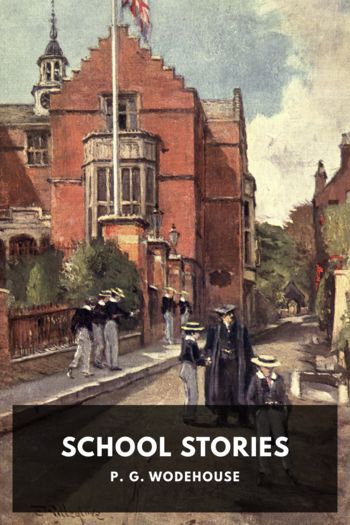School Stories - P. G. Wodehouse (best e book reader TXT) 📗

- Author: P. G. Wodehouse
Book online «School Stories - P. G. Wodehouse (best e book reader TXT) 📗». Author P. G. Wodehouse
“We shall have to get rid of him,” said Mr. Prater.
“I’m afraid so,” said Mrs. Prater.
“If you weren’t thinking of giving him to anyone in particular, sir,” said Trentham, “my sister would be awfully glad to take him, I know. She was very keen on him when she came to see me.”
“That’s excellent,” said Prater. “I was afraid we should have to send him to a home somewhere.”
“I suppose we can’t keep him after all?” suggested Mrs. Prater.
Trentham waited in suspense.
“No,” said Prater, decidedly. “I think not.” So Captain Kettle went, and the House knew him no more, and the Tabby Terror was at an end.
The Prize PoemSome quarter of a century before the period with which this story deals, a certain rich and misanthropic man was seized with a bright idea for perpetuating his memory after death, and at the same time harassing a certain section of mankind. So in his will he set aside a portion of his income to be spent on an annual prize for the best poem submitted by a member of the Sixth Form of St. Austin’s College, on a subject to be selected by the Headmaster. And, he added—one seems to hear him chuckling to himself—every member of the form must compete. Then he died. But the evil that men do lives after them, and each year saw a fresh band of unwilling bards goaded to despair by his bequest. True, there were always one or two who hailed this ready market for their sonnets and odes with joy. But the majority, being barely able to rhyme “dove” with “love,” regarded the annual announcement of the subject chosen with feelings of the deepest disgust.
The chains were thrown off after a period of twenty-seven years in this fashion.
Reynolds of the Remove was indirectly the cause of the change. He was in the infirmary, convalescing after an attack of German measles, when he received a visit from Smith, an ornament of the Sixth.
“By Jove,” remarked that gentleman, gazing enviously round the sickroom, “they seem to do you pretty well here.”
“Yes, not bad, is it? Take a seat. Anything been happening lately?”
“Nothing much. I suppose you know we beat the M.C.C. by a wicket?”
“Yes, so I heard. Anything else?”
“Prize poem,” said Smith, without enthusiasm. He was not a poet.
Reynolds became interested at once. If there was one role in which he fancied himself (and, indeed, there were a good many), it was that of a versifier. His great ambition was to see some of his lines in print, and he had contracted the habit of sending them up to various periodicals, with no result, so far, except the arrival of rejected MSS. at mealtimes in embarrassingly long envelopes. Which he blushingly concealed with all possible speed.
“What’s the subject this year?” he asked.
“The College—of all idiotic things.”
“Couldn’t have a better subject for an ode. By Jove, I wish I was in the Sixth.”
“Wish I was in the infirmary,” said Smith.
Reynolds was struck with an idea.
“Look here, Smith,” he said, “if you like I’ll do you a poem, and you can send it up. If it gets the prize—”
“Oh, it won’t get the prize,” Smith put in eagerly. “Rogers is a cert for that.”
“If it gets the prize,” repeated Reynolds, with asperity, “you’ll have to tell the Old Man all about it. He’ll probably curse a bit, but that can’t be helped. How’s this for a beginning?”
“Imposing pile, reared up ’midst pleasant grounds,
The scene of many a battle, lost or won,
At cricket or at football; whose red walls
Full many a sun has kissed ’ere day is done.”
“Grand. Couldn’t you get in something about the M.C.C. match? You could make cricket rhyme with wicket.” Smith sat entranced with his ingenuity, but the other treated so material a suggestion with scorn.
“Well,” said Smith, “I must be off now. We’ve got a House-match on. Thanks awfully about the poem.”
Left to himself, Reynolds set himself seriously to the composing of an ode that should do him justice. That is to say, he drew up a chair and table to the open window, wrote down the lines he had already composed, and began chewing a pen. After a few minutes he wrote another four lines, crossed them out, and selected a fresh piece of paper. He then copied out his first four lines again. After eating his pen to a stump, he jotted down the two words “boys” and “joys” at the end of separate lines. This led him to select a third piece of paper, on which he produced a sort of edition de luxe in his best handwriting, with the title “Ode to the College” in printed letters at the top. He was admiring the neat effect of this when the door opened suddenly and violently, and Mrs. Lee, a lady of advanced years and energetic habits, whose duty it was to minister to the needs of the sick and wounded in the infirmary, entered with his tea. Mrs. Lee’s method of entering a room was in accordance with the advice of the Psalmist, where he says, “Fling wide the gates.” She flung wide the gate of the sickroom, and the result was that what is commonly called “a thorough draught” was established. The air was thick with flying papers, and when calm at length succeeded storm, two editions of “Ode to the College” were lying on the grass outside.
Reynolds attacked the tea without attempting to retrieve his vanished work. Poetry is good, but tea is





Comments (0)